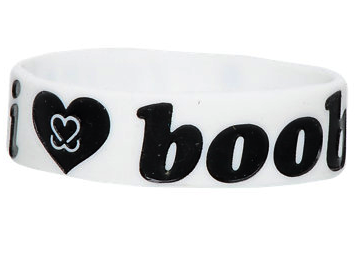Supreme Court Won’t Hear “I Heart Boobies” Bracelet Case
 Back in 2011, we told you about a U.S. District Court ruling that determined the wearing of “I Heart Boobies” breast cancer awareness bracelets by middle school students was protected under the First Amendment. An appeals panel later sided with the lower court, but the school district recently attempted to take its case before the U.S. Supreme Court. Today, the Supremes shot down that petition.
Back in 2011, we told you about a U.S. District Court ruling that determined the wearing of “I Heart Boobies” breast cancer awareness bracelets by middle school students was protected under the First Amendment. An appeals panel later sided with the lower court, but the school district recently attempted to take its case before the U.S. Supreme Court. Today, the Supremes shot down that petition.
The to-do over the bracelets began at the beginning of the 2010 school year in Easton, PA. The teachers said they began to notice that students were wearing the bracelets, which read in full “I [Heart symbol] Boobies! (Keep a Breast).”
The school district’s petition to the Supreme Court [PDF] goes into detail about the various ways in which school administrators believed the bracelets to be a distraction and causing problems among the students:
“[D]uring the September through November 2010 timeframe, there were instances of sexual harassment… particularly focused on girls’ breasts. A girl in the 7/8 Building, who was wearing an “I [Heart] Boobies!” bracelet, reported… that boys approached the girls at her lunch table and stated that they ‘love boobies.’ Another girl reported… that, while she was having a conversation with other girls at her lunch table about the ‘I [Heart] Boobies!’ bracelets, a boy interrupted them and stated ‘I love boobies’ and, while playing with fireball candies, chanted ‘boobies, boobies.’ There were also instances that were not reported… in which some boys were ‘immature’ regarding the ‘I [Heart] Boobies!’ slogan and approached other middle school girls about ‘boobies.’ Further, during the same timeframe, there were instances of boys touching girls in an unwanted sexual manner.”
The school’s principal subsequently ruled that the slogan on the bracelets was a “sexual double entendre which is prohibited by the School District-wide dress code policy.”
Some had argued that students should be allowed to wear the bracelets inside-out because the inside of the bracelets only conveyed the URL for a cancer-awareness website, however the school decided that the bracelets were too easily and too quickly turned back to their original state.
However, on the school’s official Breast Cancer Awareness Day, a trio of young women defied the new rules and openly sported the banned bracelet. Two of the girls were suspended for their refusal to remove the bracelets and for refusing to accept alternative ways of expressing their support for the cause without the bracelets. They were also not allowed to attend a school dance because of their actions.
The parents of the two students sued the school district in federal court, where the judge held that because there was nothing inherently sexual or lewd about the phrase, that the school overreached in enacting the ban.
The school district appealed the case to the 3rd Circuit Court, which held that speech “plausibly” containing “social or political” commentary may not be banned, unless the speech is “plainly lewd.” Had the bracelets been merely about “boobies” with no mention of breast cancer prevention, the school district may have had a better case.
In its appeal to the Supreme Court, the school district contended that legal precedent on the issue of the banning of lewd speech in schools does not suggest that “student speech full of sexual innuendo or scatological implications must be tolerated by the Constitution just because an argument can be made to connect them with some political or social cause.”
The school’s lawyers contend that the district did nothing to suppress the message of breast cancer prevention; it only banned one particularly, arguably lewd, version of that expression.
No reason was given for the Supremes’ denial of the district’s petition. Lawyers for the students at the middle of the ban tell USA Today they will petition the District Court judge to make his injunction against the bracelet ban permanent.
Want more consumer news? Visit our parent organization, Consumer Reports, for the latest on scams, recalls, and other consumer issues.

